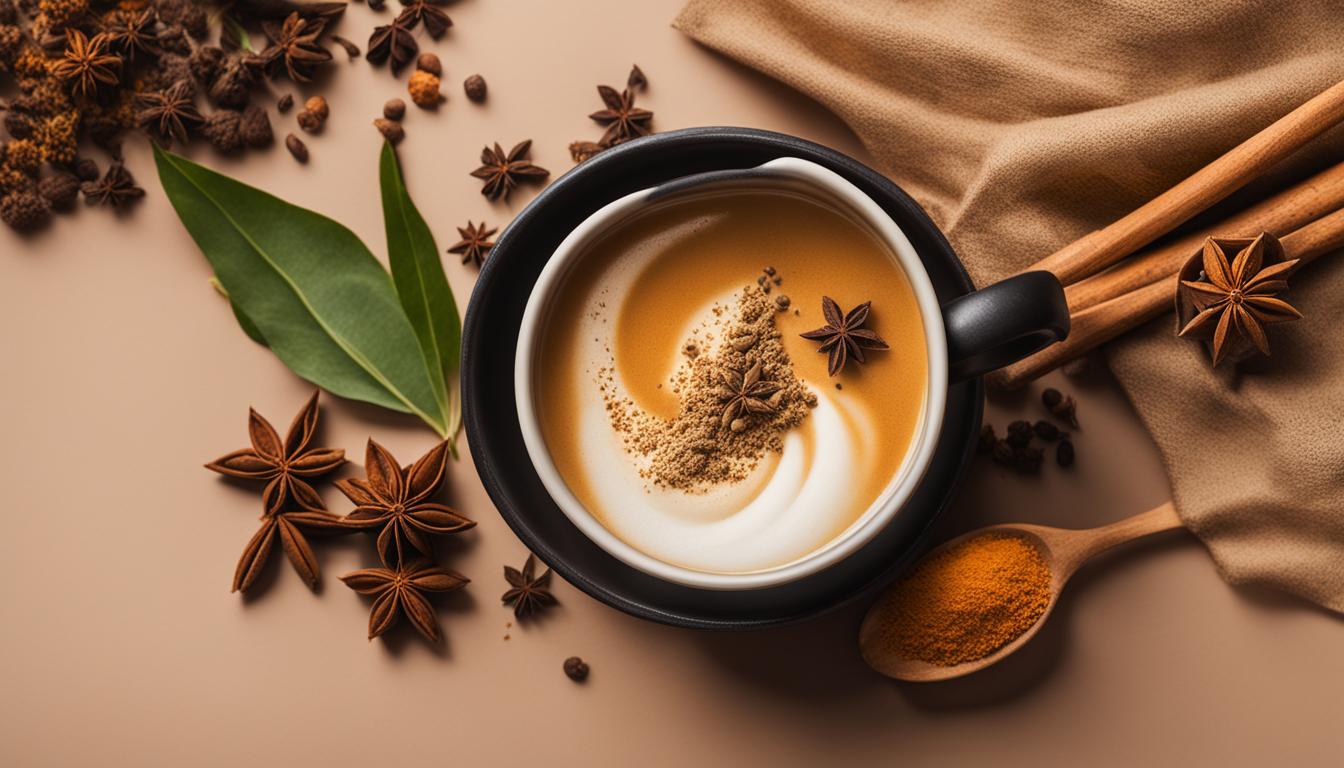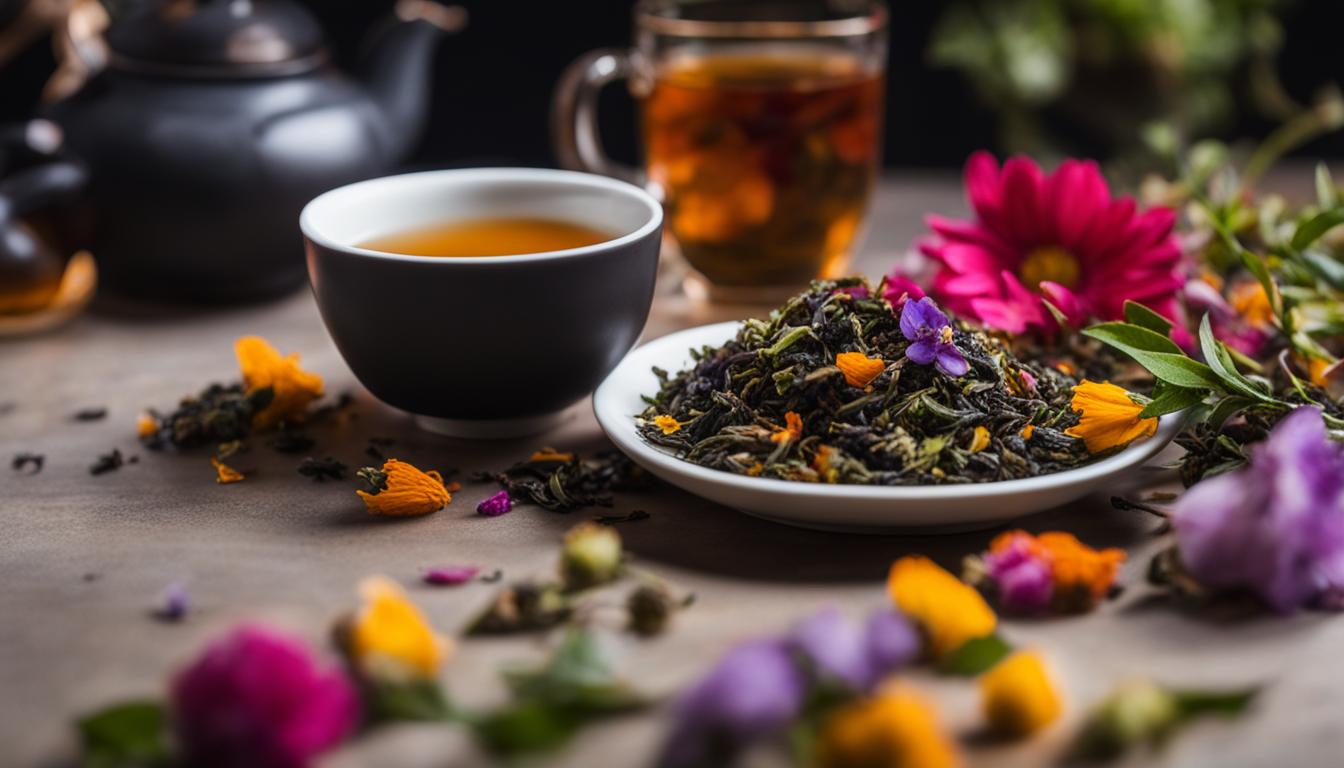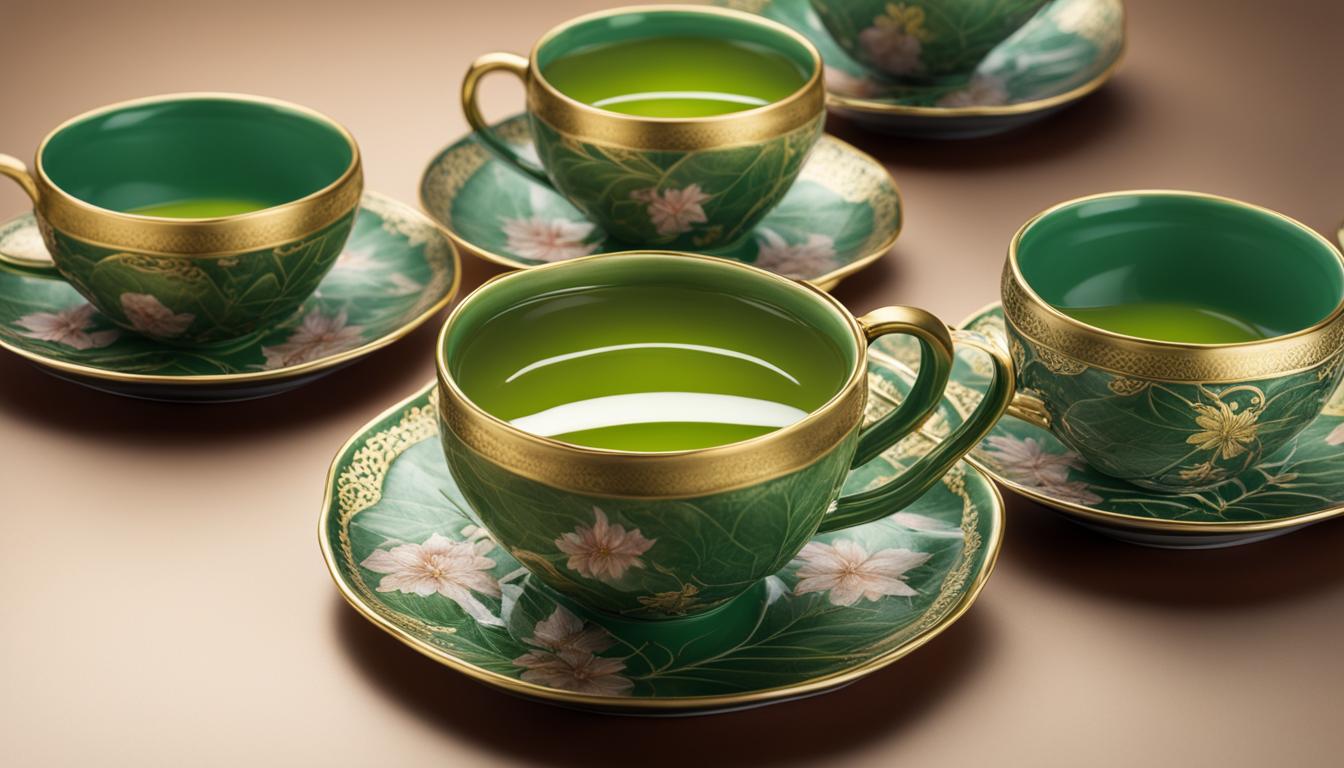Welcome to our exploration of the role of chai in Ayurvedic medicine. Chai, a beloved beverage with a rich history in India, has long been revered for its holistic healing properties. In Ayurveda, chai is not just a tea, but a carefully crafted blend of herbs, spices, and love. This ancient medicinal concoction has been used for centuries to promote digestion, boost metabolism, and nourish the body and spirit.
Key Takeaways:
- Chai tea is an integral part of Ayurvedic medicine, supporting digestive fire and overall wellness.
- The combination of herbs and spices in chai offers various therapeutic benefits, from aiding digestion to reducing appetite.
- Chai provides a sensory experience, balancing all five tastes and nourishing both the body and the spirit.
- Staple ingredients in chai, such as black pepper, cinnamon, fennel, ginger, and cloves, contribute to optimal digestion and overall health.
- Chai has a long history in Ayurveda and is celebrated for its healing power, protecting heart health and boosting the immune system.
The Science Behind Chai’s Benefits
Chai tea is not only a flavorful and comforting beverage, but it also offers a plethora of health benefits rooted in the principles of Ayurvedic medicine. The combination of herbs, spices, and tea creates a potent blend that promotes digestion and overall well-being.
Herbal Chai in Ayurvedic Practice
In Ayurvedic practice, the selection of herbs and spices in chai is carefully chosen to support optimal digestion. Each ingredient plays a specific role in enhancing the digestive process, making chai an excellent choice for those with digestive discomfort or sluggish digestion.
Ayurvedic wisdom highlights the importance of digestion as the cornerstone of good health. Chai’s blend of herbs and spices stimulates the production of digestive enzymes, improves metabolism, and helps eliminate waste more efficiently.
For example, black pepper, a common ingredient in chai, stimulates the stomach to produce hydrochloric acid, which aids in the breakdown of food. Cinnamon, another popular spice, not only aids digestion but also has anti-nausea properties. Fennel supports liver and digestive function, while ginger settles the stomach and eases motion sickness. Cloves kindle the digestive fire, promoting optimal digestion.
Holistic Benefits of Chai in Ayurveda
Chai’s benefits extend beyond digestion. The antioxidants present in tea, especially black, green, and oolong varieties used as the base for chai, contribute to heart health and help maintain cholesterol levels within a healthy range.
The holistic approach of Ayurveda recognizes that wellness is not limited to the physical body but also encompasses the mind and spirit. Chai’s harmonious blend of flavors and aromas engages all the senses, creating a truly sensory experience that calms the mind and nourishes the spirit.
The combination of the warming spices, aromatic herbs, and creamy milk in chai creates a perfect balance of sweet, sour, bitter, salt, and spice tastes. This balanced flavor profile pleases the senses and supports holistic well-being.
In summary, chai tea’s benefits are rooted in the science of Ayurveda. Its blend of herbs, spices, and tea promotes digestion, enhances metabolism, and contributes to overall wellness. By incorporating chai into your daily routine, you can experience the holistic benefits it offers for your body, mind, and spirit.
| Chai Ingredients | Main Benefits |
|---|---|
| Black Pepper | Stimulates stomach acid production for better digestion |
| Cinnamon | Aids digestion and has anti-nausea properties |
| Fennel | Supports liver and digestive function |
| Ginger | Settles the stomach and eases motion sickness |
| Cloves | Kindles the digestive fire and soothes the throat and mouth |
The Blend of Flavors and Senses in Chai
Chai tea is not just a beverage; it is a sensory experience that encompasses a harmonious blend of flavors and aromas. Rooted in Ayurvedic principles, chai tea offers a holistic approach to health and wellness. The combination of all five tastes – sweet, sour, bitter, salt, and spice – creates a balanced and satisfying experience for our taste buds. But it’s not just about pleasing our senses; chai tea also supports holistic well-being.
When we indulge in a cup of chai tea, we are not only treating ourselves to a delicious drink, but we are also embracing the power of Ayurveda-inspired ingredients. The warming spices and aromatic herbs found in chai tea create a unique flavor profile that nourishes both the body and the spirit. The milk traditionally added to chai softens the boldness of the spices, creating a creamy and comforting sensation. And the addition of honey or sugar adds a touch of sweetness that balances the spices perfectly.
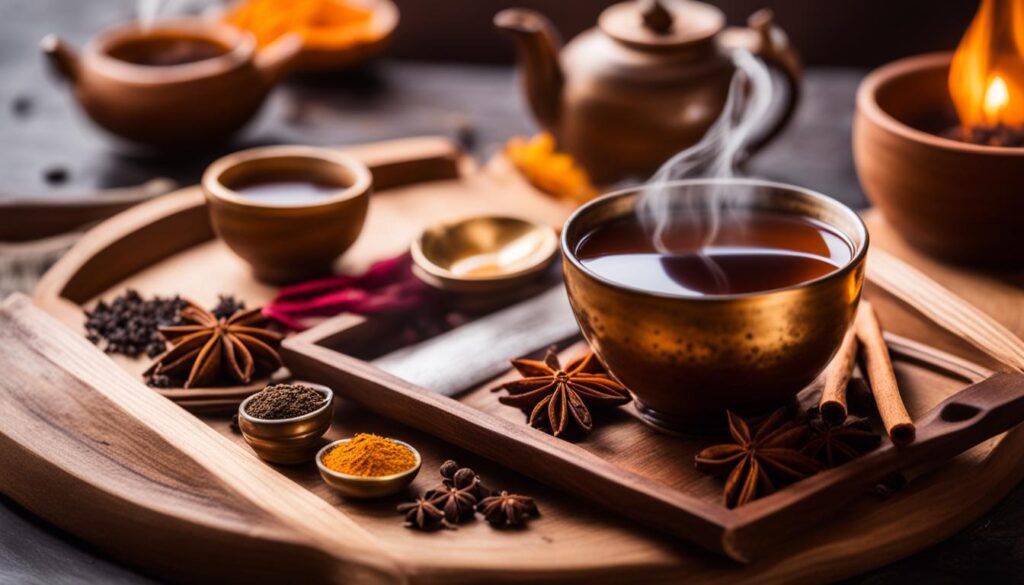
In Ayurvedic practice, chai tea is regarded as a vessel for promoting overall wellness. The blend of flavors and senses in chai not only pleases our palates but also supports our well-being on a deeper level. Each ingredient in chai has its own unique properties that contribute to our digestive health and overall wellness. From stimulating the stomach to aiding digestion, settling the stomach to kindling the digestive fire, every element of chai plays a role in supporting our holistic health.
Chai tea is a delicious and nourishing choice for those seeking a holistic approach to wellness.
The Power of Chai in Ayurveda
Ayurveda Inspired Chai Tea has a rich history and notable health benefits. Regular consumption of chai can enhance our digestive fire, soothe the digestive tract, increase waste elimination, boost metabolism, and reduce appetite. Moreover, the blend of ingredients in chai tea has specific healing properties that protect heart health, boost the immune system, and reduce inflammation. It is no wonder that chai tea has gained popularity worldwide and continues to be enjoyed in various forms and variations.
In conclusion, chai tea is more than just a flavorful beverage; it is a holistic approach to health and well-being. The blend of flavors and senses in chai supports digestion, promotes overall wellness, and offers a truly sensory experience. So, let us embrace the power of Ayurveda-inspired chai tea and savor the benefits it brings to our holistic health.
Essential Ingredients in Chai
When it comes to the preparation of chai tea in Ayurvedic practice, there are several key ingredients that play a vital role in promoting digestive health and overall well-being. These ingredients, carefully selected for their unique properties, work together to create a flavorful and therapeutic beverage.
At the heart of chai is black pepper, which stimulates the stomach and aids in digestion. The warmth of black pepper is complemented by the calming effects of cinnamon, which not only supports digestion but also fights bacteria and fungus. Fennel, another essential ingredient, promotes liver and digestive function, while ginger settles the stomach and eases motion sickness. Lastly, cloves kindle the digestive fire and provide relief to the throat and mouth.
By combining these ingredients, chai tea offers a balanced blend of flavors that not only delights the taste buds but also supports optimal digestion and overall health. Whether you’re enjoying a traditional Indian-style masala chai or experimenting with your own variations, these essential ingredients remain at the core of chai’s healing power.
| Ingredient | Benefits |
|---|---|
| Black Pepper | Stimulates the stomach and aids digestion |
| Cinnamon | Calms the stomach, fights bacteria and fungus, and has anti-nausea properties |
| Fennel | Supports liver and digestive function, promotes a healthy colon |
| Ginger | Settles the stomach, eases motion sickness |
| Cloves | Kindle the digestive fire, soothe the throat and mouth |
So, the next time you indulge in a warm cup of chai, take a moment to appreciate the rich blend of flavors and the natural healing properties it offers. From stimulating digestion to soothing the senses, chai tea continues to be a beloved and beneficial addition to the Ayurvedic diet.
The Origins and Healing Power of Chai
Chai tea has a long history in India and has been used as a healing beverage in Ayurvedic medicine for over 5,000 years. Legend has it that chai tea recipes were created in response to a Maharaja’s request for a tea infused with healing spices. In Ayurvedic medicine, chai is considered a holistic drink that rejuvenates and balances the mind, body, spirit, and environment.
The power of chai lies in its hand-selected spices, each with specific healing properties. This potent blend of herbs and spices makes chai a powerful tool for protecting heart health, boosting the immune system, and reducing inflammation. Black pepper stimulates the stomach and aids digestion, cinnamon calms the stomach and fights bacteria and fungus, fennel supports liver and digestive function, ginger settles the stomach and eases motion sickness, and cloves kindle the digestive fire and soothe the throat and mouth.
Chai tea has a long history in India and has been used as a healing beverage in Ayurvedic medicine for over 5,000 years.
The healing power of chai is not only rooted in Ayurvedic medicine but also supported by modern scientific research. The combination of herbs, spices, and tea in chai provides a harmonious balance of flavors and therapeutic properties. Regular consumption of chai can support digestion, boost metabolism, and promote overall wellness.
So, whether you enjoy a traditional Indian-style masala chai or a modern variation, embrace the power of chai in Ayurvedic medicine and savor the benefits it brings to your health and well-being.

Chai’s Role in Ayurveda
| Benefits of Chai in Ayurveda | Chai Tea in Ayurvedic Diet | Chai in Ayurvedic Medicine |
|---|---|---|
| Protects heart health | Supports digestion | Rejuvenates the mind, body, and spirit |
| Boosts the immune system | Boosts metabolism | Reduces inflammation |
| Calms the stomach | Promotes overall wellness |
The Popularity and Variations of Chai Tea
Chai tea has become increasingly popular around the world, with its unique blend of flavors and health benefits attracting a diverse range of tea enthusiasts. The term “chai tea” typically refers to Indian-style masala chai, which combines black tea, milk, sugar, and a medley of spices. However, variations of chai can be found in coffee shops and grocery stores globally, offering a wide array of flavors and preparations to suit different taste preferences.
Chai tea holds a special place in Ayurvedic diet and healing practices, known for its holistic approach to wellness. It is believed that chai originated from the request of an Indian Maharaja for a tea combined with healing spices. This traditional preparation method soon spread throughout the Indian subcontinent, and chai became a staple in Indian households and tea stalls.
In India, chai is prepared using different types of teas, such as black, green, or herbal, along with variations in the choice of milk and spices. The combination of flavors and textures in chai creates a delightful sensory experience, whether enjoyed warm or iced. Chai’s popularity and versatility make it a go-to beverage for individuals seeking both the therapeutic benefits and the enjoyment of a well-crafted tea.
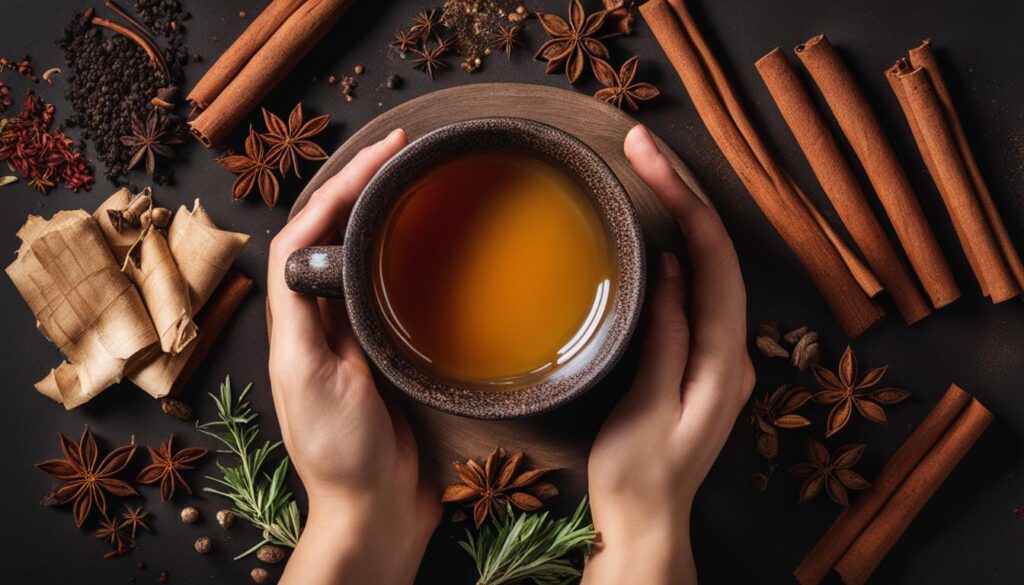
Ayurvedic Chai Recipes
In the world of Ayurveda, chai is often regarded as a nourishing and balancing beverage that supports overall well-being. Its blend of herbs, spices, tea, and milk creates a harmonious combination that promotes digestion, boosts metabolism, and provides antioxidant and anti-inflammatory benefits.
Here is a simple Ayurvedic chai recipe to try:
- In a saucepan, bring 1 cup of water to a boil.
- Add 1 teaspoon of loose black tea leaves and simmer for 2 minutes.
- Reduce the heat and add 1 cup of milk (dairy or plant-based), 1 teaspoon of grated ginger, 1/2 teaspoon of ground cinnamon, 1/4 teaspoon of ground cardamom, and 1/8 teaspoon of ground cloves.
- Simmer for another 5 minutes, stirring occasionally.
- Remove from heat, strain the tea, and sweeten with honey or sugar to taste.
Feel free to experiment with different spice combinations and adjust the amounts according to your taste preferences. Enjoy the aromatic flavors and soothing benefits of this Ayurvedic chai recipe.
Chai Variations from Around the World
While traditional Indian masala chai remains a beloved classic, chai has also evolved into various regional and cultural variations around the globe. Here are a few examples:
| Chai Variation | Ingredients | Preparation Method |
|---|---|---|
| Thai Chai | Black tea, star anise, cardamom, cinnamon, ginger, condensed milk | Brew the tea with spices, strain, and add condensed milk |
| Masala Chai | Black tea, ginger, cardamom, cinnamon, cloves, black peppercorns, milk, sweetener | Simmer the tea and spices in milk, strain, and sweeten |
| Matcha Chai Latte | Matcha green tea powder, ginger, cardamom, cinnamon, milk, sweetener | Whisk matcha with spices and hot milk, sweeten to taste |
These variations offer unique flavor profiles that bring a touch of international flair to the world of chai. Whether you prefer the traditional Indian masala chai or enjoy experimenting with different adaptations, there is a chai tea out there for every tea lover.
Conclusion
In conclusion, the role of chai in Ayurveda is undeniable. With its rich blend of herbs, spices, and tea, chai offers a multitude of benefits for Ayurvedic wellness. Regular consumption of chai can support digestion, boost metabolism, and promote overall well-being.
Chai’s unique combination of flavors and therapeutic properties makes it a delicious and nourishing choice for those seeking a holistic approach to health. Whether enjoyed in its traditional Indian form or in modern variations, chai tea remains a beloved beverage that has stood the test of time.
So, let us embrace the power of chai in Ayurvedic medicine and savor the benefits it brings to our health and well-being. Incorporating chai into our daily routine can be a simple yet effective way to enhance our holistic health and improve our overall quality of life.
FAQ
What is chai tea?
Chai tea is not just a specific type of tea, but a preparation and serving method that involves the use of milk, cream, and sweeteners like honey or sugar. It is known for its potent blend of herbs and spices that contribute to its numerous medicinal and health-promoting properties.
What are the health benefits of chai tea?
Regular consumption of chai tea can enhance digestive fire, soothe the digestive tract, increase waste elimination, boost metabolism, and reduce appetite. The combination of herbs and spices in chai further enhances its therapeutic effects, and the base tea used in chai (such as black, green, or oolong) is rich in antioxidants and beneficial for heart health and cholesterol levels.
What are the key ingredients in chai tea?
Some staple ingredients commonly found in chai tea recipes include black pepper, cinnamon, fennel, ginger, and cloves. Each ingredient has unique properties that contribute to digestion and overall wellness.
Where did chai tea originate?
Chai tea has a long history in India and has been used as a healing beverage in Ayurvedic medicine for over 5,000 years. It is believed to have originated from a request by a Maharaja for a tea combined with healing spices.
How do you prepare chai tea?
Chai can be prepared using a variety of herbs and spices, with countless combinations available. However, the common method involves steeping the tea and spices in boiling water, adding milk and sweeteners, and simmering to create a rich and flavorful beverage.
Can chai tea be enjoyed cold?
Yes, chai tea can be enjoyed hot or cold, making it a versatile beverage for any season.
What are the variations of chai tea?
Chai tea has gained popularity worldwide, and variations can be found in many coffee shops and grocery stores. In India, chai is prepared in various ways, with different types of tea, milk, and a variety of spices.

